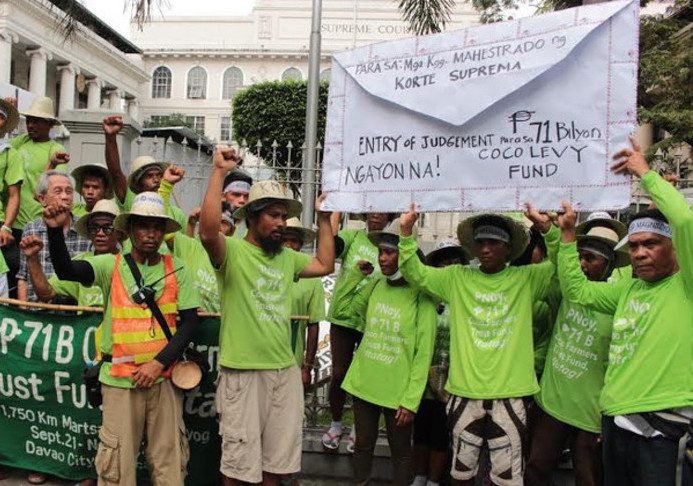SUMMARY
This is AI generated summarization, which may have errors. For context, always refer to the full article.

MANILA, Philippines – The Presidential Commission on Good Government (PCGG) said on Friday, March 8, that the recently junked coco levy cases did not amount to significant loss in monetary value for the government.
“Considering that they ceased operations way back, I believe that the probable loss in value on the dismissal of the case involving the said corporations is almost nil,” PCGG chairperson John Agbayani told Rappler on Friday.
The anti-graft court Sandiganbayan Second Division issued a ruling on February 28 that junked Civil Case No. 0033-B with finality. This case was an offshoot of the original coco levy cases, but specifically involving companies that were created from the coco levy funds: Coconut Producers Federation (Cocofed), Coconut Investment Company (CIC), Cocofed Marketing Corporation (Cocomark), and CocoLife.
The government cases are built on the premise that the late dictator Ferdinand E. Marcos, during his regime, used the taxes paid by coconut farmers so that his cronies can enrich themselves, some through the creation of companies such as those involved in the civil case.
The Sandiganbayan junked the cases with finality for violation of the constitutional right to a speedy trial. The last movement in the case was way back 2000, and an initial dismissal was handed down in 2023, which the court said the PCGG failed to dispute.
“[PCGG’s] justifications for its lapses are inexcusable,” the Second Division said in the resolution by Associate Justice Arthur Malabaguio, Associate Justice Oscar Herrera, and Associate Justice Edgardo Caldona.
“Of the four corporations in Civil Case No. 0033-B, only one is operational and that is CocoLife. The case against CocoLife is still pending,” said Agbayani.
CocoLife’s president and CEO, lawyer Martin Loon, is reportedly close to the Marcoses.
Complex cases
The PCGG’s claim that it the government did lose real value in the recent Sandiganbayan losses adds to the confusing complexity of cases involving the Marcoses’ ill-gotten wealth. In recent years, the Marcoses have scored several wins, only to be later clarified by Sandiganbayan justices in related rulings that the wins were equivalent to only a couple of properties, and that most of the assets have been already recovered by the government.
In the case of the coco levy, which could reach roughly around P100 billion, Agbayani said the PCGG has already remitted P79 billion to the Bureau of Treasury. Of that amount, P45 billion had been turned over to the Cocolevy Trust Fund Committee as mandated by the Duterte-time law, Republic Act 11524, which is meant to operationalize the return of the corrupted taxes back to the coconut farmers.
In theory, the government had already won a majority of the entire coco levy case because in 2012, the Supreme Court declared that the government owns Coconut Industry Investment Fund (CIIF) companies, 14 holding companies, and the CIIF block of San Miguel Corporation. In August 2018, the Sandiganbayan ordered the partial execution of the judgment so that “all income, interest, or profits derived from these assets [will] be used only for the benefit of all coconut farmers and for the development of the coconut industry.”
The question now is how to execute that win, a difficult undertaking in itself compounded by the other litigations being pursued by the different cast and players, for example the late crony Eduardo “Danding” Cojuangco.
In 2021, the Supreme Court granted Cojuangco’s petition to remove him from all the coco levy cases. The reason, again, for this dismissal was delay in resolving the cases.
The Marcos government is well on its way to revamping the PCGG. President Ferdinand Marcos Jr. has appointed Rogelio Quevedo, who helped his 2016 electoral protest against former vice president Leni Robredo, as PCGG commissioner. The commission will expand its mandate to cover the ill-gotten wealth of other officials, and not just the loot of the former first family.
In the Marcoses’ narrative, the expansion of the mandate is good use of resources. But for transitional justice advocates, it dilutes the mandate of the PCGG and takes away the focus and pressure on the Marcos family. – Rappler.com
Add a comment
How does this make you feel?
![[Newspoint] A fighting presence](https://www.rappler.com/tachyon/2024/07/thought-leaders-a-fighting-presence.jpg?resize=257%2C257&crop=441px%2C0px%2C1080px%2C1080px)
![[Closer Look] ‘Join Marcos, avert Duterte’ and the danger of expediency](https://www.rappler.com/tachyon/2024/06/TL-trillanes-duterte-expediency-june-29-2024.jpg?resize=257%2C257&crop_strategy=attention)









There are no comments yet. Add your comment to start the conversation.